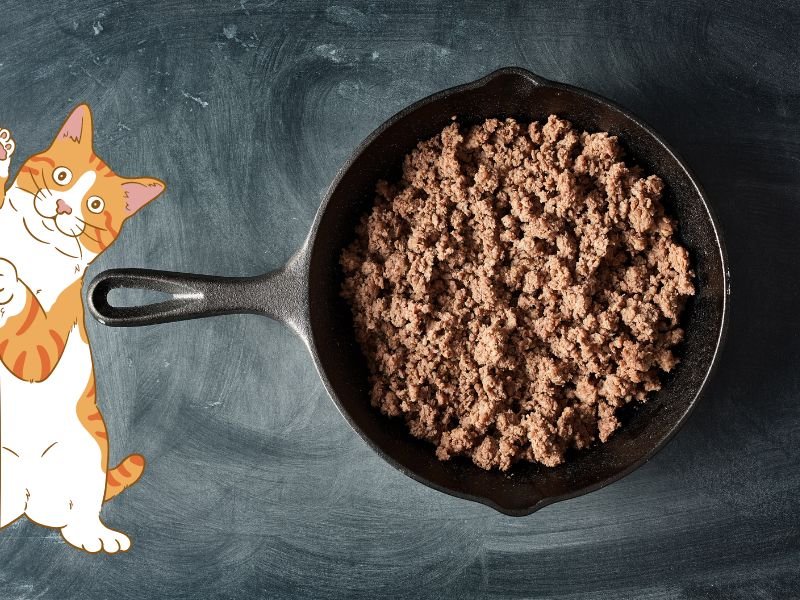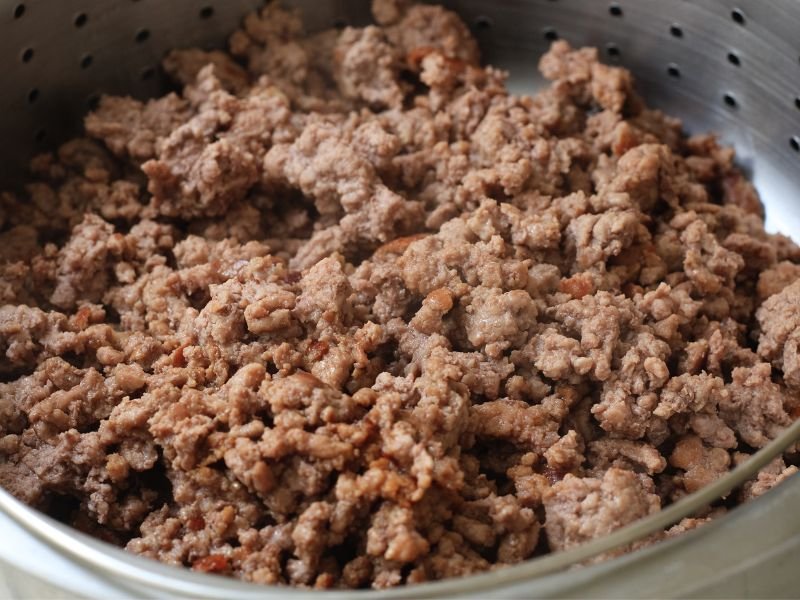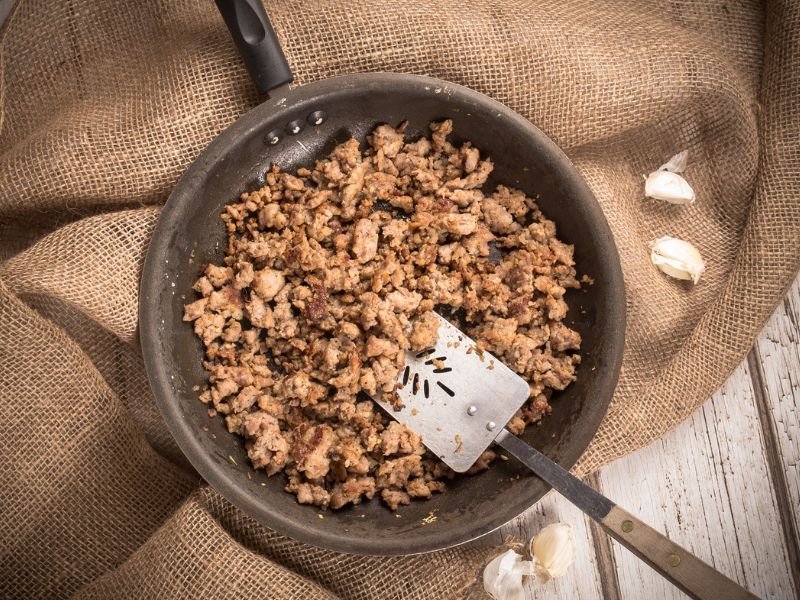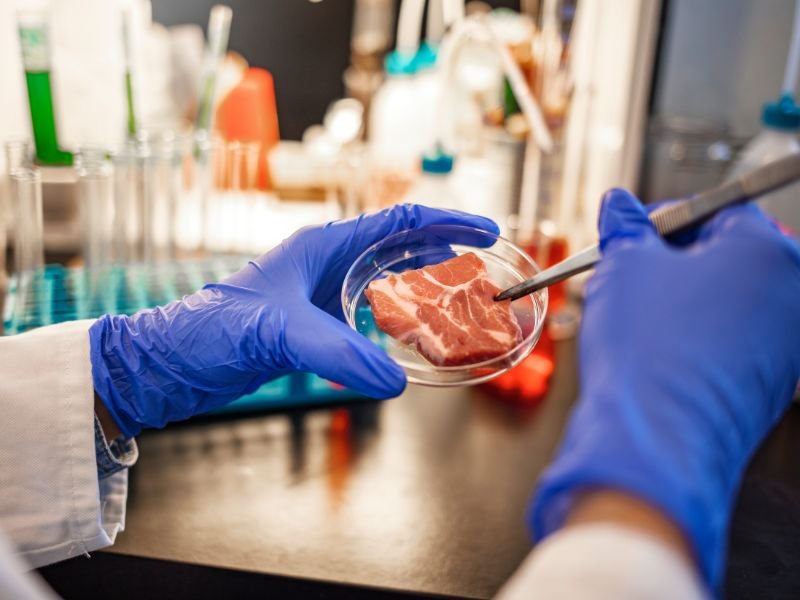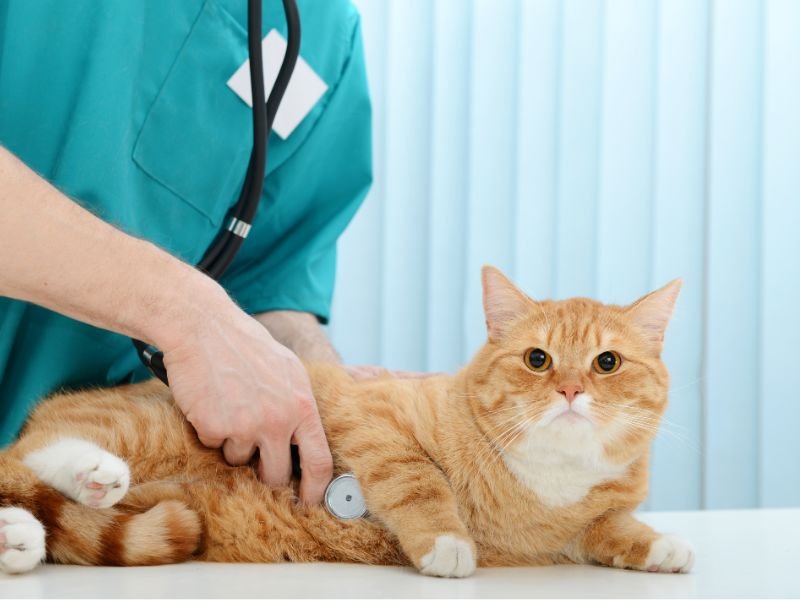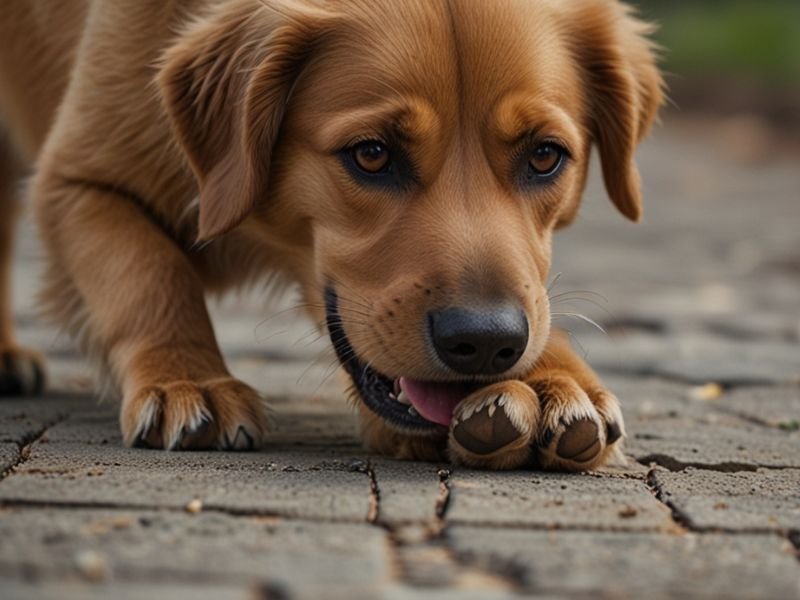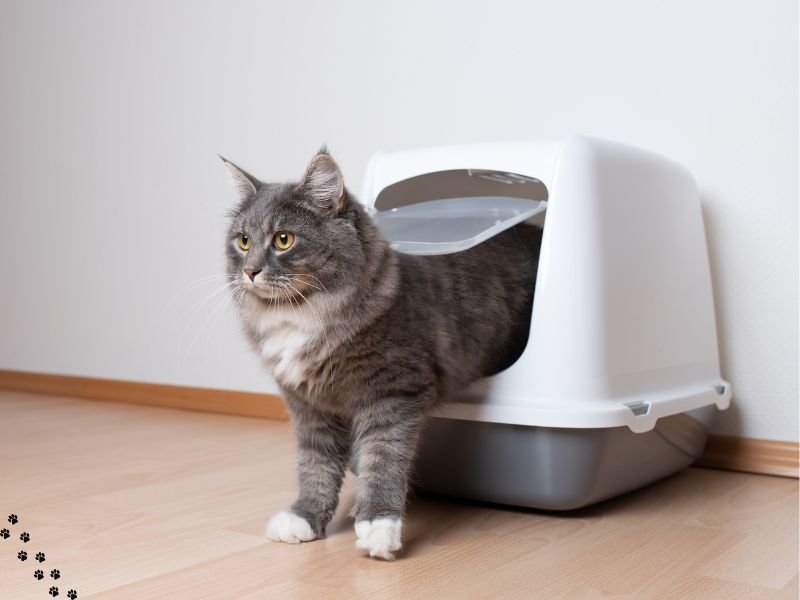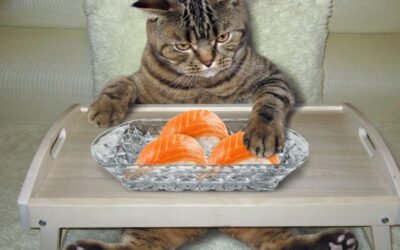Yes, cats can eat ground beef in moderation, but it is essential to prepare it properly and ensure it is part of a balanced diet.
Table of Contents
- The Nutritional Benefits of Ground Beef for Cats: Exploring the Pros and Cons
- Safety Guidelines for Feeding Ground Beef to Cats
- Common Risks and Potential Allergies: Understanding Cats’ Reaction to Ground Beef
- Methods for Preparing Ground Beef for Cats: Healthy Serving Ideas and Recipes
- Incorporating Ground Beef in Your Cat’s Diet: Balancing Protein Intake and Portion Control
- Consulting with a Veterinarian: The Key to Safely Introducing Ground Beef to Your Cat’s Diet
- FAQs About Can Cats Eat Ground Beef
- Final Words
The Nutritional Benefits of Ground Beef for Cats: Exploring the Pros and Cons
When it comes to cat nutrition, providing a balanced and nutritious diet is essential for your feline friend’s overall health and well-being.
While cats are obligate carnivores, meaning they primarily rely on meat for their nutritional needs, it’s common for cat owners to wonder whether ground beef can be a suitable addition to their pet’s diet.
In the section below we will explore the pros and cons of incorporating ground beef into your cat’s meals, helping you make an informed decision regarding their dietary choices.
Pros:
- Protein-Rich: Ground beef is a rich source of high-quality protein, which is vital for maintaining your cat’s muscles and tissues. Protein plays a crucial role in their growth, development, and overall health.
- Rich in Essential Nutrients: Along with protein, beef also contains essential amino acids, vitamins, and minerals that contribute to your cat’s overall well-being. These nutrients include vitamin B12, zinc, iron, and omega-6 fatty acids, among others.
- Palatability: Many cats find the taste and texture of ground beef appealing, making it easier for them to enjoy their meals. This can be particularly beneficial if you need to entice a picky eater or encourage a cat to transition to a new diet.
Cons:
- Unbalanced Nutritional Profile: While ground beef has several nutritional benefits, it is important to note that it alone does not fulfill all of a cat’s dietary requirements. Cats also need specific nutrients like taurine, a vital amino acid found only in animal tissues, and certain vitamins and minerals that may not be present in sufficient quantities in ground beef alone.
- Risk of Contamination: Ground beef, particularly if not handled and stored properly, can carry bacteria, such as Salmonella or E. coli, that pose a risk to both humans and cats. It is crucial to ensure proper hygiene and follow food safety guidelines when handling raw meat.
- Potential Unwanted Additives: Some commercially available ground beef may contain additives, such as preservatives or flavor enhancers, that may not be ideal for your cat’s health. It is advisable to read labels carefully or opt for organic, additive-free ground beef to minimize potential risks.
It is important to consider these factors when contemplating adding ground beef to your cat’s diet.
While it can offer certain nutritional benefits, it should be supplemented with a balanced and complete feline diet to ensure your cat receives all the nutrients for optimal health.
As always, consulting with a veterinarian is crucial in determining the best dietary choices for your individual cat’s needs.
Safety Guidelines for Feeding Ground Beef to Cats
In order to ensure the health and well-being of your beloved feline companion, it is important to be aware of a few key safety guidelines when feeding ground beef to cats.
While ground beef can be a nutritious addition to their diet, precautions must be taken to avoid any potential risks or adverse reactions.
Handling and Storage
When handling ground beef for your cat, it is crucial to prioritize food safety. Always make sure to purchase fresh, high-quality meat from a reliable source and check the expiry date before use.
Proper storage is equally essential to prevent bacterial contamination and spoilage. Store raw ground beef in the refrigerator at temperatures below 40°F (4°C) and consume it within two to three days.
Alternatively, you can freeze it in airtight containers for longer storage durations, up to three to four months.
Cooked or Raw?
One of the most debated topics is whether cats should consume raw or cooked ground beef. While raw meat may provide certain benefits like preserving important enzymes and nutrients, it can also pose a risk of bacterial contamination, such as salmonella or E. coli.
Therefore, it is generally recommended to cook ground beef thoroughly before feeding it to your cat. Cooking at temperatures above 165°F (74°C) allows for the elimination of harmful bacteria, making it safer for consumption.
Avoid Additives and Seasonings
When preparing ground beef for your furry friend, it is vital to use pure, unseasoned meat without any additives. Common ingredients like onions, garlic, salt, and spices should be strictly avoided.
These additives can be toxic or harmful to cats, potentially leading to digestive issues or even more severe health problems.
Stick to plain, natural ground beef without any additional flavorings to ensure your cat’s safety and well-being.
Understanding and following these safety guidelines will help you prioritize your cat’s health while incorporating ground beef into its diet.
Remember, it is advisable to consult with a veterinarian before introducing any new food, including ground beef, to your cat’s diet, especially if your cat has specific dietary requirements or health concerns.
By taking these precautions, you can safely offer your feline friend the occasional tasty and nutritious treat of ground beef.
Common Risks and Potential Allergies: Understanding Cats’ Reaction to Ground Beef
In order to ensure the well-being of our feline companions, it is important to be aware of the potential risks and allergies associated with feeding them ground beef.
While ground beef can provide certain nutritional benefits, it is crucial to understand that not all cats can tolerate it.
In this section, we will explore the common risks and possible allergies that cats might experience when consuming ground beef.
Allergies
Cats, like humans, can develop allergies to certain types of food, including ground beef. An allergic reaction occurs when a cat’s immune system mistakenly identifies a specific protein found in beef as harmful, triggering an immune response.
Common symptoms of a food allergy in cats may include gastrointestinal upset, skin inflammation, itching, and respiratory problems.
If you suspect your cat may have an allergy, it is important to consult with a veterinarian for proper diagnosis and guidance.
Raw feeding risks
Some cat owners may choose to feed their feline companions a raw diet, which could include ground beef.
However, it is essential to be aware of the potential risks involved in feeding raw meat to cats.
Raw ground beef may contain harmful bacteria such as Salmonella or E. coli, which can pose serious health risks to both cats and humans.
It is highly recommended to consult with a veterinarian before considering a raw food diet for your cat and to take appropriate precautions to prevent foodborne illnesses.
Quality control
Another potential risk when feeding ground beef to cats is related to the quality of the meat. Poor-quality ground beef may contain additives, preservatives, or low-quality animal protein, which can be detrimental to your cat’s health.
Always opt for high-quality ground beef that is free from additives and preservatives, and consider choosing lean cuts to avoid excessive fat intake.
By being aware of the common risks and potential allergies associated with feeding ground beef to cats, you can make informed decisions regarding their diet.
Remember, every cat is unique, and what works for one may not work for another. Consulting with a veterinarian is crucial to ensure the safety and well-being of your furry friend.
Methods for Preparing Ground Beef for Cats: Healthy Serving Ideas and Recipes
In this section, we will discuss various methods for preparing ground beef for your feline friend, providing you with healthy serving ideas and even a couple of easy-to-follow recipes.
It is important to note that ground beef should only be served to cats occasionally and in moderation, as part of a well-balanced diet.
1. Lightly Cooked Ground Beef
One of the simplest ways to prepare ground beef for cats is by lightly cooking it. Start by browning the ground beef in a non-stick pan without any seasonings or oils.
Make sure to drain the excess fat before serving it to your cat. This method helps to eliminate any potential bacterial contaminants while retaining most of the meat’s nutrients.
It is essential to let the cooked ground beef cool down completely before offering it to your cat.
2. Homemade Ground Beef Cat Treats
If you want to get a little creative and treat your cat to something special, you can make homemade ground beef cat treats.
Begin by mixing cooked and cooled ground beef with a small amount of finely chopped cat-safe vegetables, such as carrots or green beans.
You can also add a small sprinkle of dried catnip for extra feline appeal. Shape the mixture into small bite-sized treats and bake them in the oven at a low temperature until they become firm.
Let them cool before serving your cat as a delicious occasional treat.
3. Mixing Ground Beef with Cat Food
Another way to serve ground beef to your cat is by mixing it with their regular cat food. This method provides variety and can be especially useful for enticing picky eaters or for transitioning cats to a new diet.
Simply crumble the cooked ground beef and mix it in with your cat’s wet or dry food. Be mindful of the portion size and ensure that the overall diet remains balanced.
It is crucial to remember that ground beef should not be seasoned with any spices, herbs, or salt, as they can be harmful to cats.
Additionally, always consult with your veterinarian before introducing any new foods into your cat’s diet, including ground beef.
Incorporating Ground Beef in Your Cat’s Diet: Balancing Protein Intake and Portion Control
Incorporating ground beef into your cat’s diet can provide an additional source of protein and essential nutrients.
However, it is important to maintain a balance in their overall protein intake and exercise portion control to ensure their nutritional needs are met without any adverse effects.
Protein intake
Cats are obligate carnivores, meaning that they require a diet rich in animal protein for optimal health.
Ground beef can be an excellent source of protein for your feline friend.
It contains essential amino acids that help support muscle development and overall well-being.
Portion control
While protein is important, too much of it can lead to imbalances in your cat’s diet. It is crucial to remember that ground beef should be served in moderation.
Excessive consumption may result in an imbalance of nutrients, such as an inadequate intake of other essential vitamins and minerals.
Consult with your veterinarian to determine the appropriate portion size for your cat based on their age, weight, and overall health condition.
To maintain a balanced diet, consider incorporating ground beef into your cat’s meals alongside other protein sources, such as chicken or fish. This variety ensures a well-rounded nutritional profile and lessens the potential for any deficiencies.
When serving ground beef, it is also essential to cook it thoroughly to eliminate any potential bacteria or parasites that could be harmful to your cat. Avoid seasoning the meat with any spices or additives as these can be toxic and cause digestive issues in felines.
By following these guidelines and consulting with your veterinarian, you can safely incorporate ground beef into your cat’s diet, providing them with the necessary protein while maintaining a balanced nutritional profile.
Remember, moderation and variety are key to ensuring your cat’s overall well-being.
Also Check: Can Cats Eat Smoked Salmon
Consulting with a Veterinarian: The Key to Safely Introducing Ground Beef to Your Cat’s Diet
Before introducing ground beef or any new food to your cat’s diet, it is essential to consult with a veterinarian to ensure their safety and well-being.
Veterinarians play a crucial role in providing professional advice tailored to your cat’s specific dietary needs and overall health.
Their expertise can help you make informed decisions and prevent any potential risks or complications that may arise from introducing new foods.
During your consultation, your veterinarian will consider several factors such as the age, weight, breed, and pre-existing health conditions of your cat to determine if ground beef is a suitable addition to their diet.
They will also take into account any allergies or sensitivities your cat may have, as well as any specific dietary requirements.
What to expect during a consultation
Your veterinarian will take the time to listen to your concerns and answer any questions you might have about feeding ground beef to your cat.
They will provide you with specific guidelines on how to introduce ground beef gradually and monitor your cat’s response.
This gradual introduction helps to identify any adverse reactions or digestive issues that may occur.
Additionally, your veterinarian will emphasize the importance of appropriate portion control to avoid overfeeding and imbalances in your cat’s diet.
They may also recommend suitable cooking methods to ensure the ground beef is prepared in a way that maximizes its nutritional benefits while minimizing any potential risks.
Remember: Consultation with a veterinarian is crucial before making any significant changes to your cat’s diet. Their expertise will provide you with peace of mind and contribute to your cat’s overall health and well-being.
FAQs About Can Cats Eat Ground Beef
Can cats eat ground beef raw?
Yes, some cats can eat raw ground beef, but it is not recommended due to the risk of bacterial contamination and potential health issues. It is best to cook the ground beef to eliminate any potential risks.
Is cooked ground beef bad for cats?
Cooked ground beef can be safe for cats to eat in moderation. However, it should be prepared without any seasonings, onions, or garlic, which can be harmful to cats. It should also be served in small portions and as part of a balanced diet.
Can ground beef cause diarrhea in cats?
Yes, feeding ground beef to cats in large quantities or as the main staple can cause digestive upset and diarrhea.
It is important to introduce new foods gradually and in small amounts to avoid any bowel issues.
Is ground beef a good source of nutrition for cats?
While ground beef may be rich in protein, it is not a complete and balanced diet for cats. A cat’s diet should consist mainly of commercial cat food specifically formulated to meet its nutritional needs.
Ground beef can be offered as a treat occasionally but should not replace proper cat food.
Are there any health benefits of feeding cats ground beef?
Feeding cats small amounts of cooked ground beef can provide them with important nutrients like protein and essential amino acids.
However, it should always be given in moderation and as part of a balanced diet to ensure they receive all the necessary nutrients.
Final Words
Ground beef can be an occasional treat for cats when fed in moderation and cooked properly.
However, it should not replace a balanced cat food diet.
It is important to consult with a veterinarian before introducing any new food to a cat’s diet to ensure it is safe and suitable for its specific needs.

